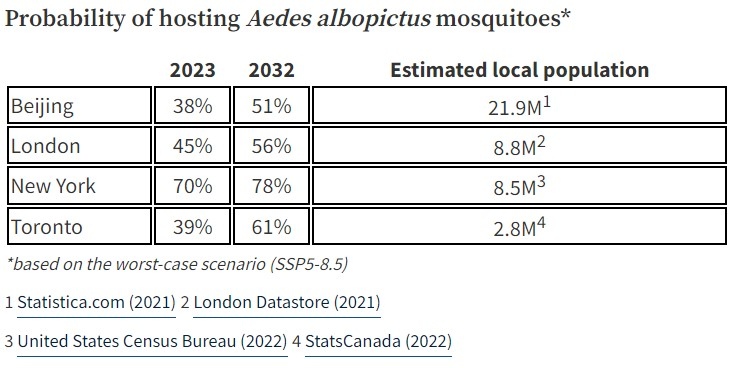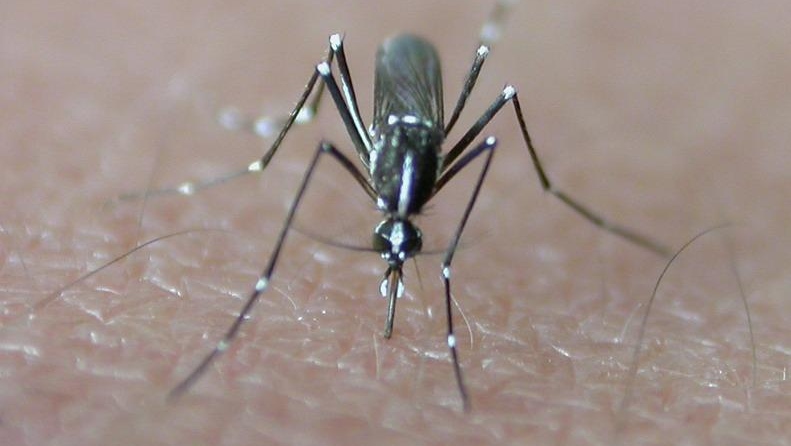Will the 'Tiger mosquito' bring infectious disease to Ontario? What you need to know
 Aedes albopictus, otherwise known as the Tiger mosquito, can be seen above. (Wikipedia Commons)
Aedes albopictus, otherwise known as the Tiger mosquito, can be seen above. (Wikipedia Commons)
A type of mosquito that can transmit over 20 pathogens known to be infectious to humans could soon inhabit southern Ontario, according to recent research.
New infectious disease modelling by Toronto-based company BlueDot suggests that rising global temperatures are causing Aedes albopictus mosquitoes, sometimes known as the 'Tiger mosquito,' to expand their global habitat boundaries.
Aedes mosquitoes are known carriers of Zika, chikungunya, dengue, yellow fever, and West Nile, among other viruses. Typically, they tend to live closer to the equator and are foreign to Canada due to the cooler climate and harsh winters, but BlueDot’s research suggests, “in the future, these mosquitoes will be able to survive and spread disease in new locations.”
The research predicts the species will expand its habitat 400 km north of New York State, into Canada, among other habitual expansions. Large urban dwellings likely to see increased populations of the insect include Beijing, London, New York, and Toronto.
Combined, these areas have an estimated population of over 40 million people.
According to the modelling, by 2032, Toronto will have a 61 per cent likelihood of hosting Aedes mosquitoes.
 Source: BlueDot Global
Source: BlueDot Global
In 2019, the Public Health Agency of Canada published a report warning that, as climate change progresses, previously foreign mosquitoes, specifically Aedes, may move into new regions within Canada, increasing the risk of mosquito-borne diseases.
“These mosquitoes have the potential to transmit over 20 pathogens that are infectious to humans,” the federal report reads. “The highly anthropophilic behaviour of [the mosquitoes] makes them two of the most medically-important mosquito species worldwide.”
The agency called for clinical and public health measures, including promoting awareness and use of mosquito bite prevention strategies, early detection and prompt response, ongoing active surveillance and mosquito control to mitigate the spread of mosquito-borne diseases.
 An Asian tiger mosquito is shown in this file photograph. (snowyowls / a href="https://commons.wikimedia.org/wiki/Creative_Commons"Creative Commons)
An Asian tiger mosquito is shown in this file photograph. (snowyowls / a href="https://commons.wikimedia.org/wiki/Creative_Commons"Creative Commons)
Thomas Tenkate, professor at Toronto Metropolitan’s School of Occupational and Public Health, told CP24 Thursday that, at this stage, he doesn’t think Torontonians need to be too concerned.
“We're really looking into the future and the impact of climate change on the temperatures, so I think [the study is] really forecasting that, across the world, there is the likelihood of the increased spread of diseases because the temperatures are going to create more favourable conditions for some mosquitoes and other insects,” Tenkate said.
The severity of the consequences of climate change that are felt will depend on the number of degrees of warming to come, he continued.
“If it's one or two degrees, and that's quite likely with climate change, it probably won't be as big a deal but if it's more than that, it could really impact us,” he said.
Kaidi Liu, Epidemiologist at BlueDot, wrote in the report that, ultimately, Bluedot’s research “underlines the need for education and procurement of medical or other countermeasures such as insect repellant, appropriate clothing or netting, and vaccinations.”
Liu writes that these resources are readily available and can help prevent the infection and the spread of mosquito-borne diseases.
CTVNews.ca Top Stories

Can the U.S. really make Canada the 51st state?
Talk of Canada becoming the 51st American state has raised an existential question on this side of the border: Could it be done? Could the maple leaf make way to the stars and stripes? According to several experts, it may be possible, but not painless.
LIVE UPDATES Five deaths reported in L.A. wildfires, Canada prepared to offer expertise
A series of wildfires are searing through the Los Angeles area, forcing many to evacuate their homes. Follow along here for the latest updates.
Convicted Jan. 6 rioter arrested as fugitive in Whistler, B.C.
An American citizen convicted of participating in the Jan. 6, 2021, riot on Capitol Hill who said he was seeking asylum in Canada has been arrested as a "fugitive from U.S. justice," according to authorities.
Energy minister 'committed' to consumer carbon tax as he considers Liberal leadership
Energy and Natural Resources Minister Jonathan Wilkinson says he would be 'committed' to the consumer carbon tax should he become Liberal leader and prime minister, despite the policy’s unpopularity.
Ontario Premier Doug Ford says he is 'OK' after OPP vehicle he was in was 'sideswiped' in Highway 401 collision
Ontario Premier Doug Ford was uninjured after an OPP vehicle he was travelling in was involved in a collision on Highway 401 earlier today.
At least 60 University of Guelph students sick as 'cluster of illness' hits residence
The University of Guelph is dealing with what they are calling a ‘cluster of illness’ among students living in residence.
New ranking suggests Canada passport among 'top 5 losers' in the world
A new global ranking may raise doubts about Canada's reputation of being open to other countries.
'A second chance at life': B.C. soccer player nearly killed by stray bullet in U.S. speaks to CTV News
Former Vancouver Whitecaps youth program player Nathan Demian was out celebrating an Ohio State victory that had propelled his top-ranked Buckeyes to soccer’s final four when he was struck by a stray bullet during a gun battle between two passing cars.
U.S. hospital workers charged in death of non-verbal patient left in scalding bath for nearly an hour
Two workers at a state-run hospital in West Virginia have been charged in connection with the death of a 61-year-old non-verbal man who investigators said was left in a scalding hot bath for nearly an hour.
































